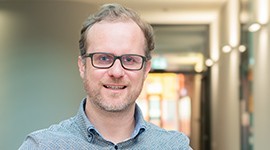Fraunhofer IZI expands expertise in the field of cellular immunotherapy with new branch office in Würzburg
A new branch of the Fraunhofer IZI was established in Würzburg at the beginning of 2024. Under the direction of Prof. Dr. Michael Hudecek, new technologies for cellular immunotherapies for the treatment of various cancers are being developed and clinically tested.
In recent years, the introduction of CAR T-cell immunotherapy has fundamentally changed the treatment algorithm for certain hematologic cancers (e.g. acute B-cell leukemia / B-cell lymphoma) like no other innovation in the past decades. It has shown that it is possible to achieve a long-lasting remission and even a cure even with advanced malignant diseases through the one-off application of genetically modified immune cells. This new class of drugs is based on the principle that the body's own immune cells are genetically modified and equipped with a synthetic, so-called chimeric antigen receptor (CAR). This receptor enables the immune cell to recognize and destroy cancer cells with the corresponding tumor antigen on their surface.
The Fraunhofer IZI already has many years of experience in the development and production of cell and gene therapeutics. The new branch office, which will be established on the premises of the former eye clinic in Würzburg, will expand expertise in the preclinical and clinical development of cell-based immunotherapies in particular.
The previous strategic cooperation between the Fraunhofer IZI and the University Hospital of Würzburg, consisting of numerous national and European joint projects, will be institutionalized with the establishment of the branch office. Under the leadership of Prof. Dr. Michael Hudecek, the group will pursue three main research priorities in the coming years.
- Development of a CAR-T and CAR-NK combination therapy with the aim of broadening the spectrum of efficacy and overcoming mechanisms of tumor resistance.
- Development of new manufacturing technologies based on non-viral gene transfer to increase manufacturing efficiency and availability.
- Expansion of the treatment spectrum by identifying and validating suitable tumor antigens and, based on this, preclinical and clinical development of new cell-based immunotherapies.
The aim of the joint research and development activities is to further improve the efficacy, efficiency and availability of cell-based immunotherapies in cancer medicine and beyond.
